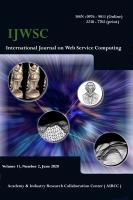Artikel,
WEB SERVICE SELECTION BASED ON RANKING OF QOS USING ASSOCIATIVE CLASSIFICATION
International Journal on Web Service Computing (IJWSC), 3 (1): 01-14 (März 2012)
DOI: 10.5121/ijwsc.2012.3101
Zusammenfassung
With the explosive growth of the number of services published over the Internet, it is difficult to select satisfactory web services among the candidate web services which provide similar functionalities. Quality of Service (QoS) is considered as the most important non-functional criterion for service selection. But this criterion is no longer considered as the only criterion to rank web services, satisfying user’s preferences. The similarity measure (outputs–inputs similarity) between concepts based on ontology in an interconnected network of semantic Web services involved in a composition can be used as a distinguishing criterion to estimate the semantic quality of selected services for the composite service. Coupling the semantic similarity as the functional aspect and quality of services allows us to further constrain and select services for the valid composite services.
In this paper, we present an overall service selection and ranking framework which firstly classify candidate web services to different QoS levels respect to user’s QoS requirements and preferences with an Associative Classification algorithm and then rank the most qualified candidate services based on their functional quality through semantic matching. The experimental results show that proposed framework can satisfy service requesters’ non-functional requirements.
